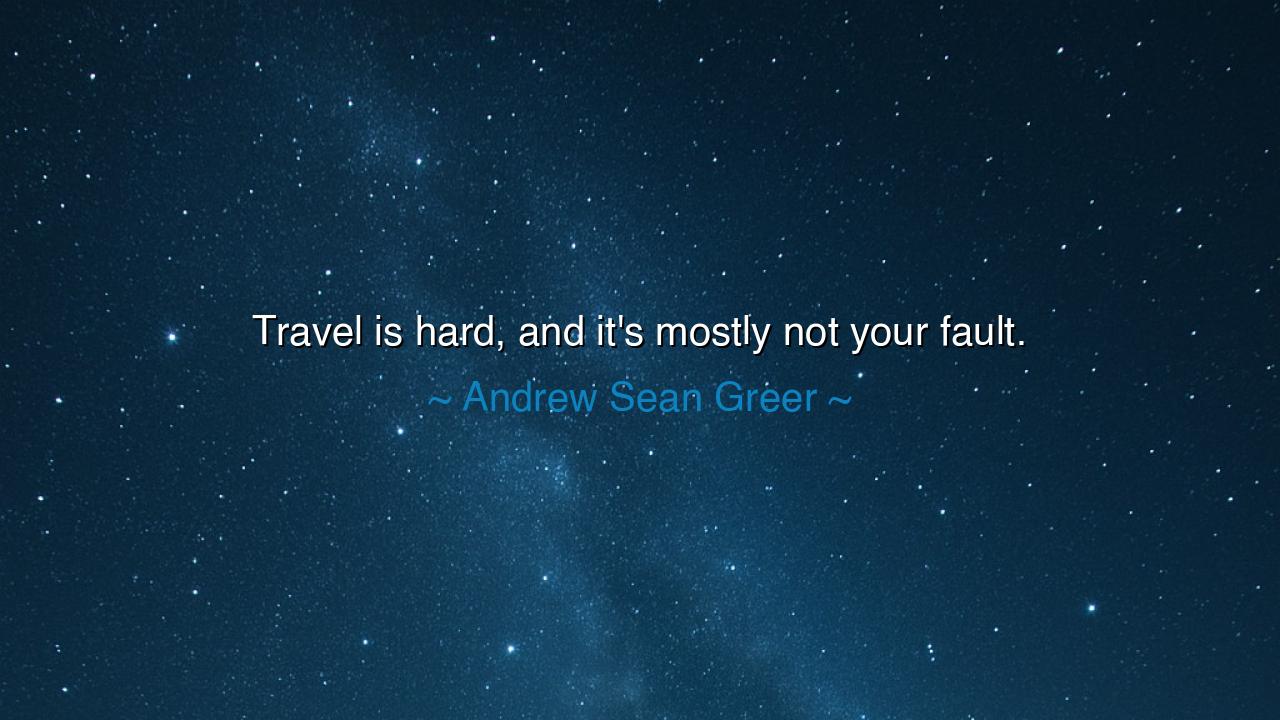
Travel is hard, and it's mostly not your fault.






Andrew Sean Greer spoke with both weariness and compassion when he said: “Travel is hard, and it’s mostly not your fault.” These words, though plain on the surface, carry the weight of ancient wisdom. They remind us that the road, though promising wonder, is also strewn with obstacles beyond our control. The delays, the discomforts, the missed trains, the storms at sea, the bureaucracies at borders—all these remind us that the journey is never as simple as desire. Yet in Greer’s phrasing there is no condemnation, no blame laid upon the traveler. Instead, there is understanding: the world resists movement, and the struggle is part of the rite.
The ancients knew this truth well. Odysseus, hero of Homer, did not wander for ten years after Troy because of laziness or fault of his own. The winds, the gods, the monsters, the temptations of strange lands—all conspired to delay him. Travel, even for one favored by Athena, was hard. And so too it is for us: to step upon the road is to submit to forces larger than our will. Greer’s words echo this eternal law: the hardship of travel is less a reflection of the traveler, and more a reminder of the vastness and unpredictability of the world.
His words also carry a tone of gentleness, a balm for modern souls who often demand perfection of themselves. In an age of schedules and efficiency, when we expect flights to arrive on time and highways to flow without end, every disruption feels like personal failure. But Greer reminds us that the struggle is not ours to own. The flight is late, the bag is lost, the language is misunderstood—yet these are not stains upon our competence, but the nature of the road itself. To release blame is to reclaim peace.
Consider the journey of Ibn Battuta, the Moroccan traveler who journeyed farther than perhaps any man of his age, covering nearly 75,000 miles across Africa, Asia, and Europe. His writings reveal countless hardships: shipwrecks, thefts, betrayals, illnesses. Yet he did not cease. He understood that travel itself was a crucible, and that the hardship did not reflect weakness but the price of wonder. So too Greer invites us to see our own difficulties not as shame, but as part of a lineage stretching back to every traveler who has ever set foot beyond their village.
The deeper lesson here is that hardship does not negate meaning. In fact, the very difficulty of travel makes its revelations more profound. The temple glimpsed after hours lost in winding streets, the friend met after a dozen failed conversations, the meal savored after a long day of hunger—these are not diminished by struggle but deepened by it. Greer, by acknowledging the hardship, teaches us to expect it, to endure it, and to find the beauty that often lies just on the other side of frustration.
Therefore, we must learn to travel not with the arrogance of control, but with the humility of acceptance. The road will not bend to us; we must bend to the road. This means patience in the face of delay, laughter in the face of discomfort, gratitude in the face of imperfection. To travel well is not to move flawlessly from place to place, but to walk with openness, allowing even the failures to become stories, and even the obstacles to become teachers.
Practically, this lesson means preparing both body and spirit. Carry what you need, yes—but also carry within you the expectation that much will go wrong. When it does, remember Greer’s words: it is mostly not your fault. Do not waste energy on blame, but instead turn your eyes to what can still be gained, what beauty still awaits. Let the broken moment soften you rather than harden you, and you will find yourself stronger than before.
Thus, Greer’s simple phrase becomes a teaching for all who walk the road: travel is hard, but it is worth it. Do not blame yourself when the world resists you, for the world resists everyone. Instead, walk with courage, patience, and joy, and you will discover that the hardships are not barriers, but part of the great tapestry of the journey itself.






AAdministratorAdministrator
Welcome, honored guests. Please leave a comment, we will respond soon